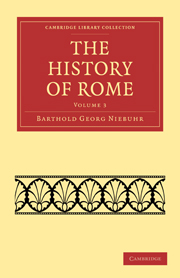Book contents
- Frontmatter
- PREFACE
- Contents
- The Licinian Rogations
- The new curule Dignities of the year 384
- Internal History down to the complete establishment of the plebeian Consulship
- On the Uncial Rate of Interest
- History of the Wars from 384 to 406
- Rome in Alliance with Latium
- The earliest Constitution of the manipular Legion
- The first Samnite War
- The Latin War
- The Laws of the Dictator Q. Publilius
- Internal History down to the Caudine Peace
- Alexander of Epirus
- Forein Relations down to the second Samnite War
- The second Samnite War
- Relations between Rome and the Nations bordering on Samnium after the Peace
- The Etruscan Wars down to the beginning of the third Samnite War
- Internal History from the Caudine Peace down to the third Samnite War
- Cn. Flavius
- The Censorship of Q. Fabius and P. Decius
- The Ogulnian Law
- Various Occurrences of the same Period
- The third Samnite War and the Others of the same Period
- Internal History from the Beginning of the second Samnite War down to the Lucanian
- Miscellaneous Occurrences of the same Period
- The Etruscan and Gallic War
- The Lucanian, Bruttian, fourth Samnite, and Tarentine Wars
- Epirus and Pyrrhus
- The Roman and Macedonian Tactics
- The War with Pyrrhus
- Entire Subjugation of Italy, and the Political Rights of the Italian Allies
- Internal History and Miscellaneous Occurrences of the Period from the Lucanian down to the first Punic War
- The first Punic War
- Index
- ERRATA
Entire Subjugation of Italy, and the Political Rights of the Italian Allies
Published online by Cambridge University Press: 01 June 2011
- Frontmatter
- PREFACE
- Contents
- The Licinian Rogations
- The new curule Dignities of the year 384
- Internal History down to the complete establishment of the plebeian Consulship
- On the Uncial Rate of Interest
- History of the Wars from 384 to 406
- Rome in Alliance with Latium
- The earliest Constitution of the manipular Legion
- The first Samnite War
- The Latin War
- The Laws of the Dictator Q. Publilius
- Internal History down to the Caudine Peace
- Alexander of Epirus
- Forein Relations down to the second Samnite War
- The second Samnite War
- Relations between Rome and the Nations bordering on Samnium after the Peace
- The Etruscan Wars down to the beginning of the third Samnite War
- Internal History from the Caudine Peace down to the third Samnite War
- Cn. Flavius
- The Censorship of Q. Fabius and P. Decius
- The Ogulnian Law
- Various Occurrences of the same Period
- The third Samnite War and the Others of the same Period
- Internal History from the Beginning of the second Samnite War down to the Lucanian
- Miscellaneous Occurrences of the same Period
- The Etruscan and Gallic War
- The Lucanian, Bruttian, fourth Samnite, and Tarentine Wars
- Epirus and Pyrrhus
- The Roman and Macedonian Tactics
- The War with Pyrrhus
- Entire Subjugation of Italy, and the Political Rights of the Italian Allies
- Internal History and Miscellaneous Occurrences of the Period from the Lucanian down to the first Punic War
- The first Punic War
- Index
- ERRATA
Summary
The three campaigns which still followed, before the war in southern Italy was brought to a close, seem, with the exception of the fate of Tarentum, to have past away without such occurrences as stand forth in a manner to attract the attention of hasty and unlearned epitomisers, amid the repetition of monotonous narratives of the ravages of war and the taking of unimportant places. This however is evident, that Rome availed herself of the entire removal of all danger, in order to recover breath after the continued exertions of the last nine years, which had been increast since the landing of Pyrrhus beyond all previous example: otherwise the first two years would have been adorned not merely by a single triumph over the Tarentines and Samnites. In order to have rest themselves, they allowed the Lucanians and Bruttians to rest.
Tarentum meantime was already doing penance for the outrage she had committed. A phrurarchus regarded himself as tyrant of the city entrusted to his power, and it was only in consequence of a mild disposition, which but few among those usurpers possest and Milo not at all, that this power was not exercised in the most revolting manner. Many citizens conspired against him; as their undertaking failed, those who succeeded in making their escape, took possession of a castle where they obtained peace from the Romans.
- Type
- Chapter
- Information
- The History of Rome , pp. 523 - 547Publisher: Cambridge University PressPrint publication year: 2010First published in: 1842

